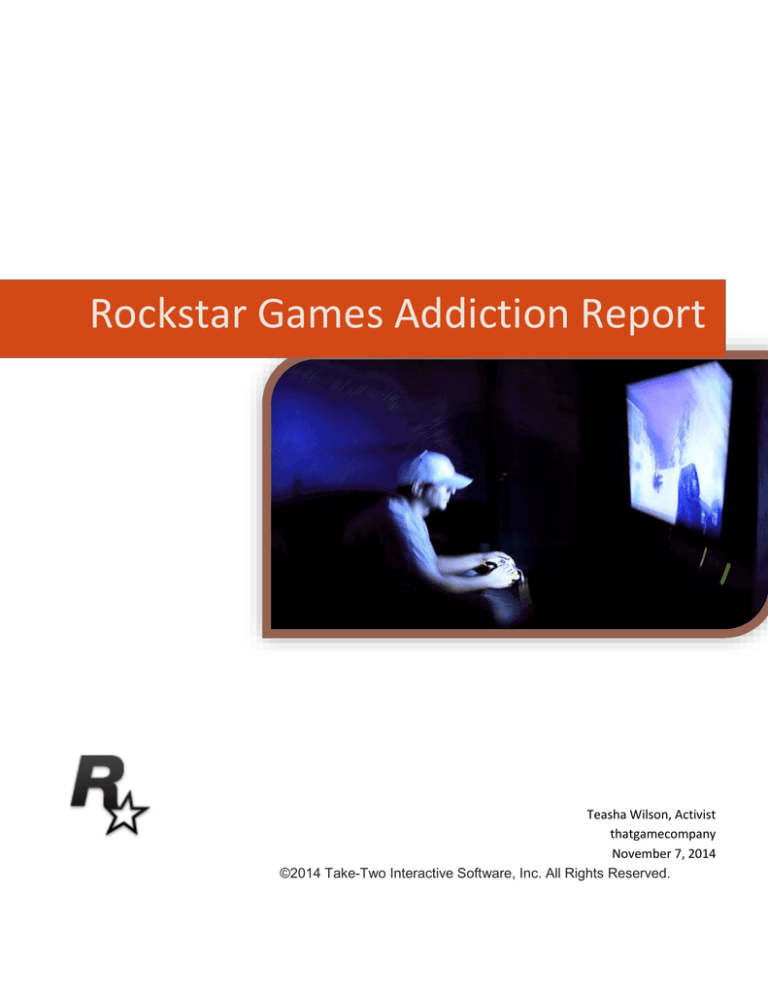
Rockstar Games Addiction Report
Teasha Wilson, Activist
thatgamecompany
November 7, 2014
©2014 Take-Two Interactive Software, Inc. All Rights Reserved.
1
Contents
Introduction…………………………………………………………………2
What is Gaming Addiction……………………………………………3
MMORG .......................................................................... 2
The Individual Gamer ....... Error! Bookmark not defined.
2
1. Introduction
a.) The Rockstar Games label was founded in
1998 to create the most innovative and
progressive interactive entertainment. It is a
wholly owned subsidiary of Take-Two
Interactive Software, Inc.
Take-Two Interactive, Rockstar Games,
Rockstar North, Rockstar San Diego, Rockstar
Vancouver, Rockstar Toronto, Rockstar
Leeds, Rockstar Lincoln, 2K Games, Global
Star Software and related logos are trademarks of Take-Two Interactive Software, Inc. The
Rockstar logo is a registered trademark of Take-Two Interactive Software, Inc. The PlayStation
and the PS Family logo are registered trademarks of Sony Computer Entertainment Inc.
Microsoft, Xbox, Xbox 360, Xbox Live, the Live logo, and the Xbox logos are either registered
trademarks or trademarks of Microsoft Corporation in the United States and/or other countries
and are used under license from Microsoft. Nintendo, Nintendo GameCube and the Official Seal
are trademarks of Nintendo. The ratings icon is a registered trademark of the Interactive Digital
Software Association. All other marks and trademarks are the property of their respective
owners.
Rockstar Games follows IDSA guidelines for the marketing of all M rated titles. (source Rockstar
website)The main headquarters of Rockstar Games (commonly referred to as Rockstar NYC) is
located on Broadway in the SoHo neighborhood of New York City, part of the Take-Two
Interactive offices. It is home to the marketing, public relations and product development
departments. As of February 2014, Rockstar Games titles have shipped more than 250 million
copies, the largest franchise being the Grand Theft Auto series, which alone has shipments of at
least 157.5 million.(source Wikipedia)
Over the years, the company has been at the center of many controversies. With them having
many M rated games that include much violence, nudity, racial remarks, and sexism. One of the
biggest problems that company is faced with currently is gaming addiction.
3
1. What is Gaming Addiction?
a.)
Video game addiction is real. Video games are becoming increasingly complex,
detailed, and compelling to a growing international audience of players. Gaming
becomes an addiction when it starts to interfere with a person's relationships or their
pursuit of other goals, such as good grades or being a contributing member of a
sports team. Although gaming addiction is not yet officially recognized as a
diagnosable disorder by the American Medical Association, there is increasing
evidence that people of all ages, especially teens and pre-teens, are facing very real,
sometimes severe consequences associated with compulsive use of video and
computer games.
i.)
Computer and video games, especially the massive multi-online role-playing
games (or MMORPGs) such as "World of Warcraft," allow players to behave
very differently from their normal persona. A shy child can suddenly became
gregarious; a passive child can become aggressive. Young people, who often
feel powerless in their daily lives, suddenly have the ability to command
armies, drive cars, and wreak havoc on a virtual world with no real-life
consequences. Video game and Internet addiction are not actual Diagnostic
and Statistical Manual of Mental Disorders (DSM)-IV classifications, although
the American Medical Association is reviewing research in order to
determine whether they should be included in the next update of the
manual in 2010. Many mental health professionals feel that video games are
similar to gambling as an addictive process, and by some estimates, as many
as 10 percent of gamers exhibit addictive behavior. There are a number of
symptoms associated with gaming addiction that can differ depending on the
age of the individual. Although it hasn't been given an "official" diagnosis,
addiction-like behaviors with computer and video gaming have noticeably
increased among both teenagers and adults. Like any addictive behavior,
there are signs to look for if you suspect someone might have a gaming
addiction. If someone only exhibits two or three of these symptoms for his or
her behavior they are considered "addictive."
1) Signs and Symptoms
a) Preoccupation
i) Someone who is addicted to computer, video, or Internet gaming often exhibits an
unusual preoccupation with the game or computer when he is away from it. The
teen could seem distracted, irritable, or disinterested and may talk about the game
almost constantly
b) Downplaying Computer Us
i) It's common for someone with addictive, computer-related behaviors to
downplay the amount of time she spends in front of the TV or computer. The
person may make excuses, saying she "needs" to be online, or may outright
lie.
c) Lack of Control
i) A person who is addicted, or at risk of becoming addicted to gaming, is
unable to control the amount of time she spends on the computer. She may
4
d)
e)
f)
g)
h)
i)
go online with the intent to spend 15 or 20 minutes, but will keep extending
the time until several hours have passed.
Loss of Time
i) Along the same lines, a person may sit down at his computer, again with the
intent to spend only a few minutes, but completely lose track of time and
suddenly find that several hours have passed. It is not unusual for someone
with a gaming addiction to play through the night and only realize how much
time has passed when the sun begins to rise.
Negative Impact on Other Areas of Life
i) Because the person spends so much time on the computer or video game
console, other areas of life are neglected. He may grow distant from friends
and family who had previously been close. Homework may go unfinished,
causing grades to slip. In more extreme cases, the teen may even neglect
personal hygiene, choosing to play video games rather than taking a shower.
Hiding From Negative or Uncomfortable Feelings or Situations
i) Some people become addicted to gaming because they use it to selfmedicate. When confronted with situations or feelings that are uncomfortable
(feeling sad, arguing with a friend, or getting a bad grade), the person may
"hide" in the game as a method of avoidance.
Defensiveness
i) When confronted or asked about his time spent gaming, a person may
become defensive. Denial is often an indication that something is wrong,
especially if the person seems unconcerned that friends and family feel
neglected or left out of his life.
Misuse of Money
i) Someone who is addicted to video, computer, or Internet gaming will spend a
disproportionate amount of money on computer-related items. The person will
seem to be continually upgrading hardware, software packages, and
accessories. This becomes an even greater problem if the person spends
money that should be used for bills, groceries, and other necessities.
Mixed Feelings
i) As with any addiction, use of the "substance" – in this case, the video game –
initially causes euphoric feelings, but that euphoria is quickly followed by guilt.
Guilt may be felt either over what the person is doing while online or simply
the amount of time he is spending at the computer.
Do not assume that gaming addiction is something that on teenagers and children
would suffer from. From powerful businessmen to a stay-at home parent anyone can
have the impulse to play games instead of take care of their responsibilities. Many adults
feel overwhelmed by their responsibilities. These days, it’s not hard to understand why.
Adults are frequently called upon to balance demanding jobs, the needs of spouses and
children, and problems with ailing parents or friends in crisis. Everyone needs time to
relax, unwind, and take his or her minds off real life. But those who begin to play video
games excessively may become so engrossed in the virtual fantasy world that they shirk
their responsibilities and other interests. Here are a few red flags that may point to a
bigger problem:
• Lying about how much time you spend playing computer or video games
• Playing computer or video games results in intense feelings of pleasure or guilt that
seem uncontrollable
• Spending more and more time playing video or computer games to get the same
5
enjoyment
• Withdrawing from friends, family, or your spouse to the point of disrupting family,
social, or work life
• Experiencing feelings of anger, depression, moodiness, anxiety, or restlessness when
you’re not gaming
• Spending significant sums of money for online services, computer upgrades, or
gaming systems
Thinking obsessively about being on the computer or playing video games even when
doing other things







